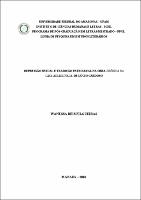| ???jsp.display-item.social.title??? |


|
Please use this identifier to cite or link to this item:
https://tede.ufam.edu.br/handle/tede/6362Full metadata record
| DC Field | Value | Language |
|---|---|---|
| dc.creator | Filgueiras, Wanessa Reis | - |
| dc.creator.Lattes | http://lattes.cnpq.br/6971621249445516 | por |
| dc.contributor.advisor1 | Silva, Lajosy | - |
| dc.contributor.advisor1Lattes | http://lattes.cnpq.br/4220995373459046 | por |
| dc.date.issued | 2018-02-27 | - |
| dc.identifier.citation | FILGUEIRAS, Wanessa Reis. Repressão sexual e tradição patriarcal na obra crônica da casa assassinada, de Lúcio Cardoso. 2018. 107 f. Dissertação (Mestrado em Letras) - Universidade Federal do Amazonas, Manaus, 2018. | por |
| dc.identifier.uri | https://tede.ufam.edu.br/handle/tede/6362 | - |
| dc.description.resumo | A pesquisa objetivou estudar o romance Crônica da casa assassinada (1959), de Lúcio Cardoso. Seu foco é a família Meneses, uma família patriarcal, outrora aristocrática que se encontra em decadência financeira e moral no momento da narrativa. O presente trabalho explorará o tempo e o espaço na narrativa, a família patriarcal, questões de gêneros e o papel da mulher naquele contexto histórico, aspectos modernos e pós-modernos do romance. Na parte teórica tivemos o apoio de Pierre Bourdieu, Judith Butler, Zygmunt Bauman, Regina Dalcastagnè, dentre outros que constituem partes fundamentais desta pesquisa. Por meio da análise e do apoio teórico observou-se como a família patriarcal se constituía e como o patriarca influenciava na vida de todos que o cercavam. Na parte teórico-literária verificamos como o romance foi moldado e alguns aspectos da escrita do autor. | por |
| dc.description.abstract | The research aimed to study the novel Crônica da casa assassinada (1959), by Lúcio Cardoso. Its focus is Meneses’ family, a patriarchal family, once aristocratic, found in financial and moral decay at the moment of the narrative. The present work will explore time and space in the narrative, the patriarchal family, gender issues and the role of women in that historical context, modern and postmodern aspects of the novel. In the theoretical part we had the support of Pierre Bourdieu, Judith Butler, Zygmunt Bauman, Regina Dalcastagnè, among others that constitute fundamental parts of this research. Through analysis and theoretical support it was observed how the patriarchal family constituted itself and how the patriarch influenced the lives of all who surrounded him. In the theoretical-literary part we verify how the novel was shaped and some aspects of the author's writing. | eng |
| dc.format | application/pdf | * |
| dc.thumbnail.url | https://tede.ufam.edu.br//retrieve/21606/Disserta%c3%a7%c3%a3o_Wanessa%20R.%20Filgueiras.pdf.jpg | * |
| dc.language | por | por |
| dc.publisher | Universidade Federal do Amazonas | por |
| dc.publisher.department | Faculdade de Letras | por |
| dc.publisher.country | Brasil | por |
| dc.publisher.initials | UFAM | por |
| dc.publisher.program | Programa de Pós-graduação em Letras | por |
| dc.rights | Acesso Aberto | por |
| dc.rights.uri | http://creativecommons.org/licenses/by-nc-nd/4.0/ | - |
| dc.subject | Patriarcado | por |
| dc.subject | Família patriarcal | por |
| dc.subject | Teoria Queer | por |
| dc.subject | Tempo Pós-Moderno | por |
| dc.subject.cnpq | LINGUÍSTICA, LETRAS E ARTES: LETRAS | por |
| dc.title | Repressão sexual e tradição patriarcal na obra crônica da casa assassinada, de Lúcio Cardoso | por |
| dc.type | Dissertação | por |
| Appears in Collections: | Mestrado em Letras | |
Files in This Item:
| File | Description | Size | Format | |
|---|---|---|---|---|
| Dissertação_Wanessa R. Filgueiras.pdf | 1.4 MB | Adobe PDF |  Download/Open Preview |
This item is licensed under a Creative Commons License





